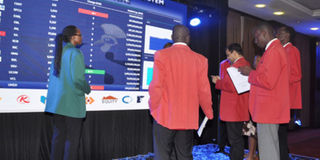Stock market profits drop over reduced trading activity

Stock brokers go through the day’s trading at the Uganda Securities Exchange in Kampala using the new automated system. FILE PHOTO
Kampala- Uganda’s stock exchange is paying the price for a weak economy that the country experienced in the second half of 2015 that partly contributed to reduced turnover during the year.
The Uganda Securities Exchange (USE), where shares owwf publically listed companies are traded, revealed that during 2015, companies traded shares valued at Shs187 billion down by 60 per cent from Shs466 billion traded in 2014.
According to financial statements released on Thursday, this partly contributed to the drop in income for the USE.
“Total income decreased by 33 per cent from Shs4.3 billion to Shs2.9 billion mainly due to the decline in turnover in the equity market,” Mr Paul Bwiso, the chief executive officer, USE said in the financial statement.
The drop in turnover affected all income generating activities for the USE.
Income from fees and commissions generates nearly 60 per cent of all income from the brokerage firms declined to Shs1.8 billion from Shs3 billion in 2014.
When brokerage firms are selling fewer shares, then the money generated also reduces, which affects the income of the USE.
The fortunes of the USE were further dented by rising expenses. Total expenses rose 53 per cent to Shs2.6 billion in 2015, which almost wiped out the Shs2.9 billion income.
In 2014, expenses were Shs1.7 billion, which was less than half of the income. In 2015, the USE started the trading of shares using an automated system.
The fall in income and rise in company expenses contributed to the net profit of the USE of Shs276 million from Shs1.7 billion in 2014.
The USE has eight locally listed companies and eight closs-listed companies. Ninety per cent of trading activity is generated by cross-listed companies.
In 2015, the most active counters, which generate more than half of the turnover, were Umeme and Stanbic Bank. British American Tobacco helped prop up the Local Share Index with a surge in its share price.
However, the total value of the USE shed off Shs2 trillion to Shs24 trillion in 2015 from Shs26 trillion mostly because of the reduced prices for companies cross-listed from Nairobi Stock Exchange (NSE).
Mr Bwiso said in 2016, there will be focus towards bringing more people to buy shares from publically listed companies.
“The exchange will be launching direct market access and mobile phone trading this year. This initiative will enable our investors, both local and international, to trade in financial securities through their mobile phones and this will thus significantly increase market awareness and trading activity,” he said in the statement.
There are an estimated 40,000 people who participate in the trading of shares on the USE.




